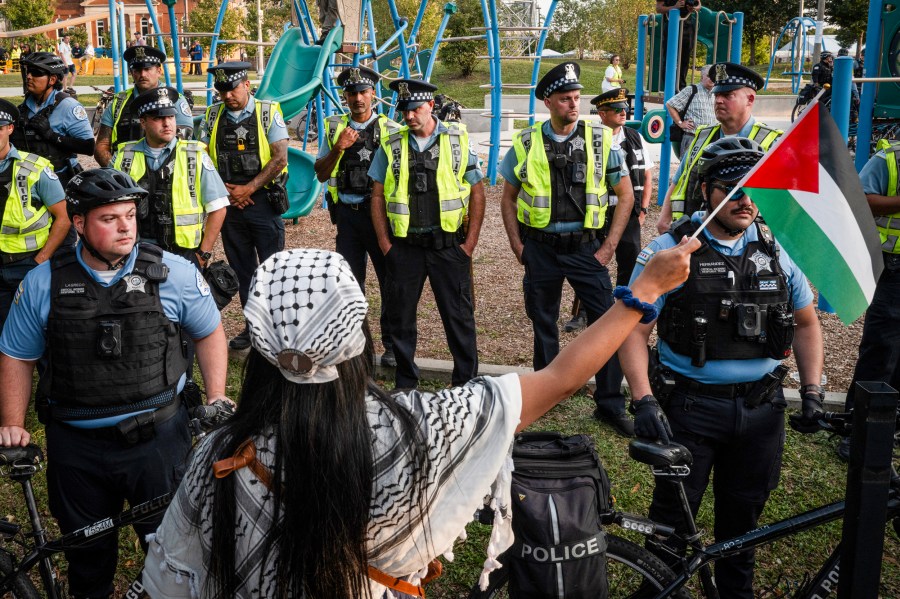Before the Democratic National Convention kicked off, a big question on my mind was, “How is the party going to address the crisis in the Gaza Strip?” We now have an answer: by sweeping it under the rug.
Over the course of four days of lively speeches — infused with an extra excitement around Vice President Kamala Harris’ emergence as the unexpected party nominee — the Biden administration’s backing of Israel’s barbarous military operation in the Gaza Strip rarely came up. It reflects a gamble by the Democratic Party that it can win the election by snubbing the movement objecting to it, by pretending that the U.S. is not supplying munitions used in atrocities.
It’s hard to conclude anything other than that in the Democratic establishment’s eyes, Israeli lives matter more than Palestinian lives.
Despite a constant refrain about standing up for the little guy, calls for the protection of Palestinian civilians were all but absent. Despite all the rhetoric about a big tent, speakers and programming ignored the thousands of protesters outside the convention calling for a change in U.S. foreign policy toward Gaza. Despite all the calls for inclusivity and the showcasing of several Republican speakers, Democratic officials rejected a request from the “Uncommitted” movement to allow a Palestinian American to speak from the main stage.
Georgia state Rep. Ruwa Romman, a Palestinian American and one of the Democrats backed by the Uncommitted movement as a potential speaker, shared the speech she wanted to deliver with Mother Jones. That speech, which the Uncommitted movement said it was open to having vetted and edited, was a far cry from a radical text. In keeping with the overall party position, it called for a cease-fire and for Democrats to mobilize for Harris — and singled out Trump as bad for Palestinians. But it would have drawn more attention to the Palestinian civilians who are being killed en masse in Gaza, and it hinted at the possibility of policy change.

The DNC gave a substantial speaking slot to the parents of an Israeli American man who was tragically abducted on Oct. 7 during Hamas’ vicious attacks on Israel. The speakers framed their plea for a cease-fire and the release of Hamas’ hostages as an apolitical, humanitarian demand. If the DNC had wanted to give an equivalent speaker a platform to discuss the experience of Americans with Palestinian relatives suffering or killed in Gaza, that would’ve been easy.
But in reality none of these speeches are truly apolitical — as evidenced by the DNC’s decision to allow a family tied to only one side of the Israeli-Palestinian conflict to speak. From that choice, it’s hard to conclude anything other than that in the Democratic establishment’s eyes, Israeli lives matter more than Palestinian lives. However, I believe that even a purely “apolitical” speech by a Palestinian American calling attention to the horrors that abound in Gaza would have had its own issues. What’s happening in region is in fact not some kind of natural disaster: Human rights observers and scholars of genocide — a number of them Israeli — have characterized Israel’s ongoing conduct in Gaza as perpetrating genocide. What’s needed is not thoughts and prayers and vague acknowledgements of suffering. What’s needed are policy changes, with the U.S. ending its exceptional and effectively unconditional financial, military and diplomatic support for Israel.
The handful of times that DNC speakers mentioned the Israeli-Palestinian conflict, the situation in Gaza was mentioned only briefly, if at all. President Joe Biden and Harris both called for a cease-fire and acknowledged that people in Gaza are suffering. (Some pundits thought Harris used new language suggesting she may stand to the left of Biden on the issue. Those pundits are wrong.) But the Biden administration’s ongoing reliance on “we’re working on a cease-fire” rhetoric appears to be sly positioning. It allows Biden and Harris to sound sympathetic to the pro-Palestinian left. But, crucially, the language makes no commitment to change or condition a single element of the U.S. relationship toward Israel. For example, the United States’ best leverage to pressure Israeli Prime Minister Benjamin Netanyahu — who has dragged his feet in the negotiation process — on a cease-fire that actually respects Palestinian autonomy is to credibly threaten to cut off the unending supply of military and financial resources.













